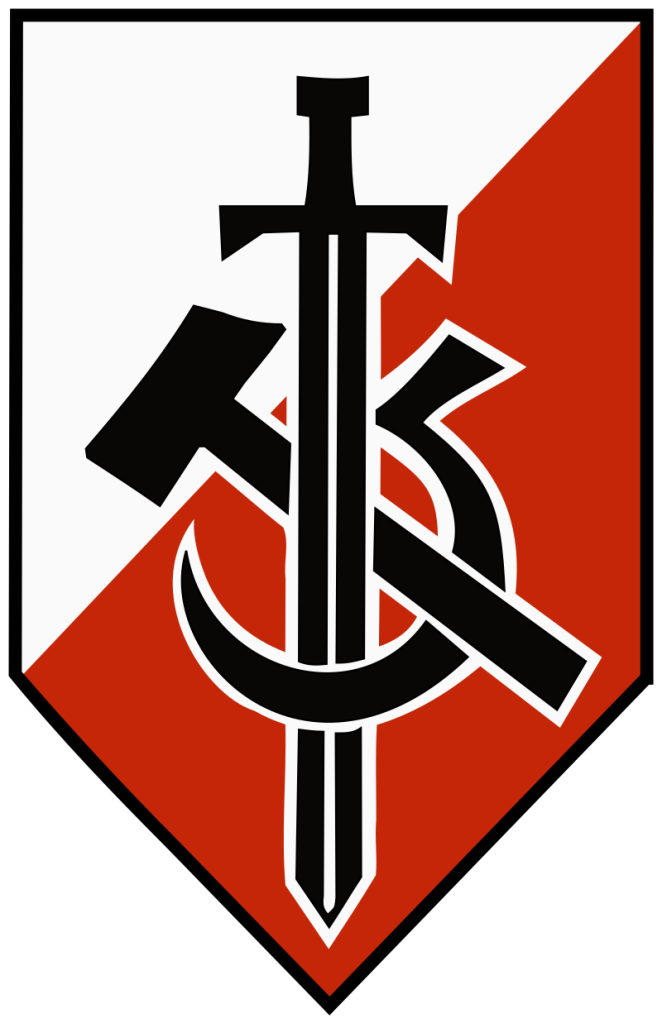
Anyone reading The Fourth Estate will come away with a number of peculiar conclusions and historical facts. Some thought-provoking arguments have been proffered and attempts have been made to overcome the metaphysical framework of Liberal Capitalism. Together with the completion of The Work-Standard, every new Blog post I contribute to The Fourth Estate continues to support my arguments that the 20th century never ended in the 21st century. I have so far been able to categorically organize most of the Blog posts here as follows:
- “Compendium Posts” argued that American Conservatism, American Nationalism and American Socialism shared the same primordial point of origin through the philosophical worldview of Alexander Hamilton. Completing The Work-Standard–what I have been referring to as the “SMP Compendium”–informed me about the ideological void within American Conservatism and the ways in which that void can be filled by Hamiltonian Federalist Socialism.
- “Economic History Posts” identified examples in Latin America, Europe and Asia where various historical figures and personalities sought after the Unity of Opposites between Nationalism and Socialism. Venezuela, Cuba, Weimar Germany, Soviet Russia, Mainland China, North Vietnam, North Korea, and even Japan.
- “Philosophy Posts” featured my readings of Prussianism and Socialism, Der Arbeiter, some selected readings of Marxist Philosophy, Nietzschean Philosophy, and even aspects of Kantian and Hegelian Philosophies. Friedrich Nietzsche’s “God is Dead” was reinterpreted as “Marx is Dead” insofar as Vladimir Lenin’s Weltanschauung was more Nietzschean than Marxist, implying that “Marxism-Leninism” is a misnomer that deserves to be replaced by Nietzscheanism-Leninism.
- “Politics Posts” are related to my personal discussions about contemporary US politics and more general topics related to Political Science as part of the “Philosophy Posts.”
- And “Third Place Posts” refer to ongoing attempts by me to identify any potential concepts and ideas that can only be revealed and explored further upon the completion of all “Compendium Posts.” As I am writing this Post, “Total Educational Effort (Pt. III of V)” has yet to be completed. Nothing has been done to complete the rest of that series of posts under the Third Place Subcategory.
This three-part series of Blog posts pertains to a recurring topic on my mind for the past several months. It has so far eluded all serious inquiry and discussion about the Unity of Opposites between Nationalism and Socialism. Anyone who regularly reads The Fourth Estate should understand that Pan-Germanic Socialism cannot and must never be mistaken for “Hitlerism.” The term “National Socialism” should always be reserved for broader contexts that go beyond 1945 and beyond the German-speaking world.
National Socialism has been the geopolitical norm for all Socialisms since 1945 because International Socialism fell out of favor early on in the Cold War, as evidenced by the Albanian-Soviet, Yugoslav-Soviet, and Sino-Soviet Disputes of the late 1940s and early 1950s. There is also the multitude of conflicts among the Socialist nations of the Eastern Bloc during the Cold War, none of which has been properly understood by historians or political scientists in the Western world. Neoliberalism even rendered International Socialism obsolete, superseded by the Globalization spearheaded by the Liberal International Economic Order (LIEO) of the Western Bloc countries.

Most Socialists from the Western world remain unaware of these historical facts because the significance of these events are unknown to them, kept behind the ideological language of “Dogmatism and Revisionism” among the Eastern Bloc countries. It is understandable for them to be immediately skeptical of Pan-Germanic Socialism and Hitlerism being perceived as two separate ideologies. After all, Hitlerism was promoted by the so-called Nationalsozialistische Deutsche Arbeiterpartei (NSDAP; National Socialist German Workers Party).
But what I am encountering here is yet another example of the Freedom-Security Dialectic and its relationship to the Mind-Body Problem of Rene Descartes. There is no doubt in my mind that Pan-Germanic Socialism, as long as it remains associated with Hitlerism, will continue to be prevented from being revisited by anyone. The problems with Pan-Germanic Socialism are easily distinguishable from those of all other Socialisms. Even American Socialism does not suffer from the same issues as Pan-Germanic Socialism, its own metaphysical struggles related to the Great Divergence inside of the Federalist Party (as in Hamiltonian Federalism vs. Madisonian Federalism and Constitutional Preamble vs. Constitutional Bill of Rights).
These observations concerning Pan-Germanic Socialism have been supported in my recent readings about Hannah Arendt’s Banality of Evil. For those who do not know, the Banality of Evil is a concept from Eichmann in Jerusalem: A Report on the Banality of Evil. Arendt wrote the book in 1963 regarding her observations of the trial of Adolf Eichmann:
“Evil comes from a failure to think. It defies thought for as soon as thought tries to engage itself with evil and examine the premises and principles from which it originates, it is frustrated because it finds nothing there. That is the Banality of Evil.”
She insisted that the “evil acts” committed by this Individual cannot be the result of them simply “being evil” or having any adherence whatsoever to Pan-Germanic Socialism. Rather, such evil acts can only be made possible by the Führerprinzip–people “following orders” and never being allowed to question them, which has always been an integral part of Hitlerism. No Socialism, not even Pan-Germanic Socialism, is designed to accommodate the Führerprinzip because it is antithetical to all Socialisms when put into practice.
What Arendt never encountered in Adolf Eichmann was “Eichmann the Hitlerist,” which is the personality that the Israeli government sought to project onto Eichmann himself. What Arendt saw on the contrary was a man still struggling to define himself as an Individual and had lifelong difficulties thinking for himself as a consequence. The Führerprinzip was what motivated Eichmann to act in the manner that he did when the Hitlerists governed Germany. Arendt later argued that the Eichmann trial was a “show trial” arranged by the Israeli government out of Parliamentarian opportunism (which also ties with her conclusions in The Human Condition and On Revolution), reminding her reader about why Eichmann was being victimized:
“Justice insists on the importance of Adolf Eichmann. On trial are his deeds, not the sufferings of the Jews, not the German people or mankind, not even Antisemitism and Racism.”
I should mention that Arendt was never trying to prove that Eichmann was entirely innocent. There is no indication in her writing that this was the Intent:
“The trouble with Eichmann was precisely that so many were like him, and that the many were neither perverted nor sadistic, that they were, and still are, terribly and terrifyingly normal. From the viewpoint of our legal institutions and of our moral standards of judgment, this normality was much more terrifying than all the atrocities put together.”
The real “evil” that Eichmann had committed was complacency. The Banality of Evil is literally the same complacency also condemned by people like Arthur Moeller van den Bruck and Richard Alan Clarke in their own respective works. But whereas Clarke was opposed to the Banality of Evil in the context of the Cassandra Coefficient, van den Bruck was opposing the Banality of Evil in the context of Prussian Socialism:
“We do not yet know who will solve the problems that remain for Socialism. We [German Conservatives] cannot believe that German Communism which still clings faithfully to [Karl] Marx will contribute to the solution, though German Communism has about it something that is savagely and obstinately German. In any case we know—and we must believe—that the [Conservative] Socialism which we have in mind must and will solve its problems on a higher plane than Marx’s: on a plane where the problems are not those of a class but of the nation. [I]t is a purely intellectual advantage: but it is a great one. We have only to think of the complete absence of ideas which [the Liberal Capitalists] display: their victory brought them complacency, satiety—in spite of the economic and political peril which threatens their countries.”
-Arthur Moeller van den Bruck, Das Dritte Reich, ca. 1923
The significance of Arendt’s observations about Adolf Eichmann raises a lot of questions from my own research into Pan-Germanic Socialism. The world is preparing to enter the next phase of the 21st century but so far everything has been a continuation of the 20th century. The only differences as of late are all related to Technology. Everything in the 2020s is far more sophisticated than whatever was available in the 1920s. Information is now more capable of traveling to any corner of the planet in a matter of seconds.
If there is anything to distinguish Pan-Germanic Socialism from Hitlerism and all other Socialisms (including American Socialism), it should be its historical implications of humanity’s encounters with Technology (or “Technicity”) on a worldwide scale. No other Socialism, not even American Socialism, was inclined to ascertain the ethical questions about why every new innovation must be rooted in a tradition. For what one is bound to find in Pan-Germanic Socialism’s history, prior to being subverted by Hitlerism, are the consequences of innovation being stripped of any discernible tradition and tradition being stripped of any discernible innovation. There is always this sense of social alienation and uprootedness that is unusual for any Socialism to have because it is not related to Kapital and Schuld or even Liberal Capitalism. The “Class Struggle” for Pan-Germanic Socialism is Man vs. Machine. So long as the LIEO continues to exist, American Socialism and all other Socialisms are blind to these historical realities.
In my recent readings of Rudolf Jung’s Der nationale Sozialismus, I find the same pattern of thinking described by Arendt. It too reminds me of Arendt’s conclusions and those questions posed by Martin Heidegger’s 1966 interview with Der Spiegel:
SPIEGEL: We understand very well. However, since we do not live 300 years hence but here and now, silence is denied us. The rest of us — politicians, half-politicians, citizens, journalists, etc. — must constantly make decisions. We must adapt ourselves to the system in which we live, must seek to change it, must scout out the narrow openings that may lead to reform, and the still narrower openings that may lead to revolution. We expect help from philosophers, even if only indirect help — help in roundabout ways. And now we hear only: I cannot help you.
Heidegger: Well, I can’t.
SPIEGEL: That must discourage the non-philosopher.
Heidegger: I cannot [help you], because the questions are so difficult that it would run counter to the sense of this task of thinking to suddenly step out in public in order to preach and dispense moral censures. Perhaps we may venture to put it this way: to the mystery of the planetary domination of the un-thought essence of technicity corresponds the tentative, unassuming character of thought that strives to ponder this unthought [essence].
SPIEGEL: You do not count yourself among those who, if they would only be heard, could point out a way?
Heidegger: No! I know of no way to change the present state of the world immediately, [even] assuming that such a thing be at all humanly possible. But it seems to me that the thinking that I attempt might be able to awaken, clarify, and confirm [a] readiness [for the appearance of a god] that I have mentioned already.[…]
SPIEGEL: A clear answer! But can — and may — a thinker say: just wait — we will think of something within 300 years?
Heidegger: It is not simply a matter of just waiting until something occurs to man within 300 years, but rather to think forward without prophetic claims into the coming time in terms of the fundamental thrust of our present age that has hardly been thought through [at all]. Thinking is not inactivity, but is itself by its very nature an engagement that stands in dialogue with the epochal moment of the world. It seems to me that the distinction between theory and practice comes from metaphysics, and the conception of a transmission between these two blocks the way to insight into what I understand by thinking. Perhaps I may refer to my lectures under the title, ‘What is Called Thinking?’ that appeared in 1954. Maybe this, too, is a sign of our time, that of all my publications, this is the least read.
SPIEGEL: Let us return to where we began. Would it not be thinkable that we see National Socialism, on the one hand, as the actualization of this ‘planetary encounter’ and, on the other, as the last, worst, strongest and, at the same time, weakest protest against this encounter between ‘planetary technicity’ and modern man? Obviously you have in your person a [certain] polarity that brings it about that many by-products of your activity are to be explained properly only by the fact that different sides of your nature (that do not touch your philosophical core) cling to many things that as a philosopher you know have no firm base — for example, concepts such as ‘home,’ ‘rootedness’ and the like. How do these things go together: planetary technicity and home?
Heidegger: I do not agree. It seems to me that you take technicity in much too absolute [a sense]. I see the situation of man in the world of planetary technicity not as an inextricable and inescapable destiny, but I see the task of thought precisely in this, that within its own limits it helps man as such achieve a satisfactory relationship to the essence of technicity. National Socialism did indeed go in this direction. Those people, however, were far too poorly equipped for thought to arrive at a really explicit relationship to what is happening today and has been underway for the past 300 years.
SPIEGEL: Do the Americans today have this explicit relationship?
Heidegger: They do not have it either. They are still caught up in a thought that, under the guise of pragmatism, facilitates the technical operation and manipulation [of things], but at the same time blocks the way to reflection upon the genuine nature of modern technicity. At the same time, here and there in the USA attempts are being made to become free from pragmatic-positivistic thinking. And who of us would be in a position to decide whether or not one day in Russia or China very old traditions of ‘thought’ may awaken that will help make possible for man a free relationship to the technical world?

Categories: Politics

hi
LikeLike